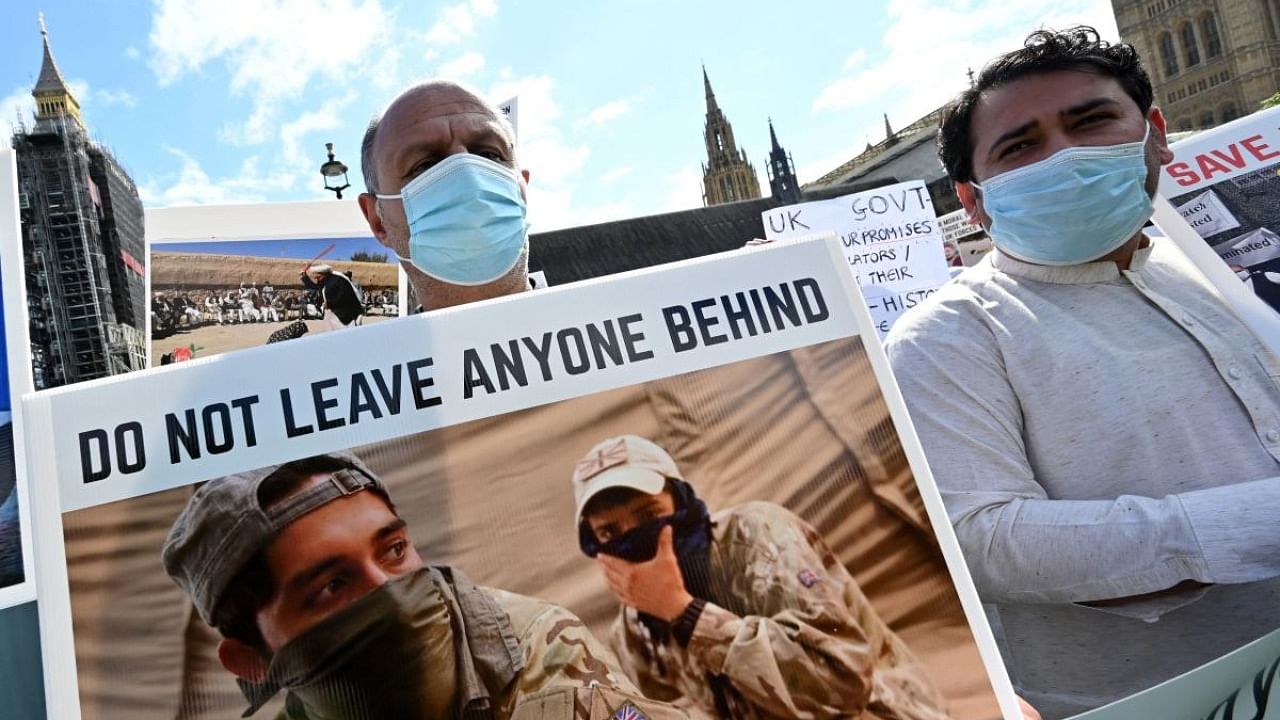
Safir Khan shed tears after watching the Taliban regain power in his native Afghanistan, sending thousands fleeing to Kabul airport in a desperate bid to escape.
"There's no life in our country. The Taliban never help people -- they only know how to kill people," the 31-year-old asylum seeker told AFP.
He is among thousands of Afghans in Britain watching their stranded compatriots try to flee, many of them with bitter memories of the abuses carried out by the Taliban during its last stint in power between 1996 and 2001.
The sight of a government propped up for two decades by Western money and troops falling to Taliban insurgents within two weeks has left many British Afghans despondent.
"We never thought the Taliban would return. The dream we had for the future of Afghanistan has collapsed," said Nooralhaq Nasimi, who reached Britain in a refrigerated lorry after fleeing Afghanistan in 1999.
"It's a desperate situation -- there's no bright future. Afghanistan is left behind once again by the international community," added Karim Shirin, director of the Afghan Association of London.
Western leaders -- particularly US President Joe Biden -- have been criticised for withdrawing troops too hastily and abandoning Afghanistan to the hardline Islamists.
"Building a nation, a democracy, is a long-term solution. Twenty years is not enough. The US decision wasn't logical and reasonable," said Nasimi, director of London's Afghanistan and Central Asian Association.
Fahima Zaheen, head of London-based Afghan refugee association Paiwand, said those fleeing to the UK need urgent support from groups like hers, which would in turn need help from the authorities.
"The government had the past 20 years to prevent this situation," she said, accusing officials of ignoring the plight of Afghans.
Fears are growing that the Taliban could take action against those who worked for Western military forces, or others who were employed by the government, in the army, journalists and activists.
Kabul-born Homed Mohammad claimed asylum in Britain in 2001 and remembers when the Taliban chopped off the hands of thieves, terrorised women and banned music and football.
"All I care about is my family over there -- I don't know what is going to happen," he said.
The UK government on Tuesday announced it would take 20,000 refugees "in the long-term" and 5,000 in the first year, prioritising women, children and those most vulnerable to Taliban reprisals.
Adris Tokhi, an immigration solicitor at Paiwand, has been inundated with an "unimaginable" number of inquiries from worried Afghans and said the commitment did not go far enough.
"The first year is the important year -- people want their family members out as soon as possible," he told AFP.
Undocumented Afghan refugees often suffer from mental trauma and discrimination and cannot work or receive welfare payments, excluding them from society.
Khan has been trying to obtain asylum in Britain since arriving from Jalalabad, east of Kabul, in 2008 and suffers from persistent mental health problems.
"It's really depressing -- whenever I think about it, I lose my control. You ask a disabled guy to walk, but he can't walk -- that's the feeling," he said.
The fate of Afghan women has become a key issue.
The Taliban previously barred girls from school and women from work and imposed wearing the full-face veil, the burkha, under their strict interpretation of Islamic law.
"I'm worried about the future. There's been a vast amount of progress and it would be unfortunate if we start from zero," said Paiwand advocacy service manager Mariam Baraky.
But Shirin believes the Taliban cannot reverse 20 years of educational, political and civil society development in Afghanistan.
"People cannot cope with another atrocity by the Taliban," he said.
Deccan Herald is on WhatsApp Channels| Join now for Breaking News & Editor's Picks